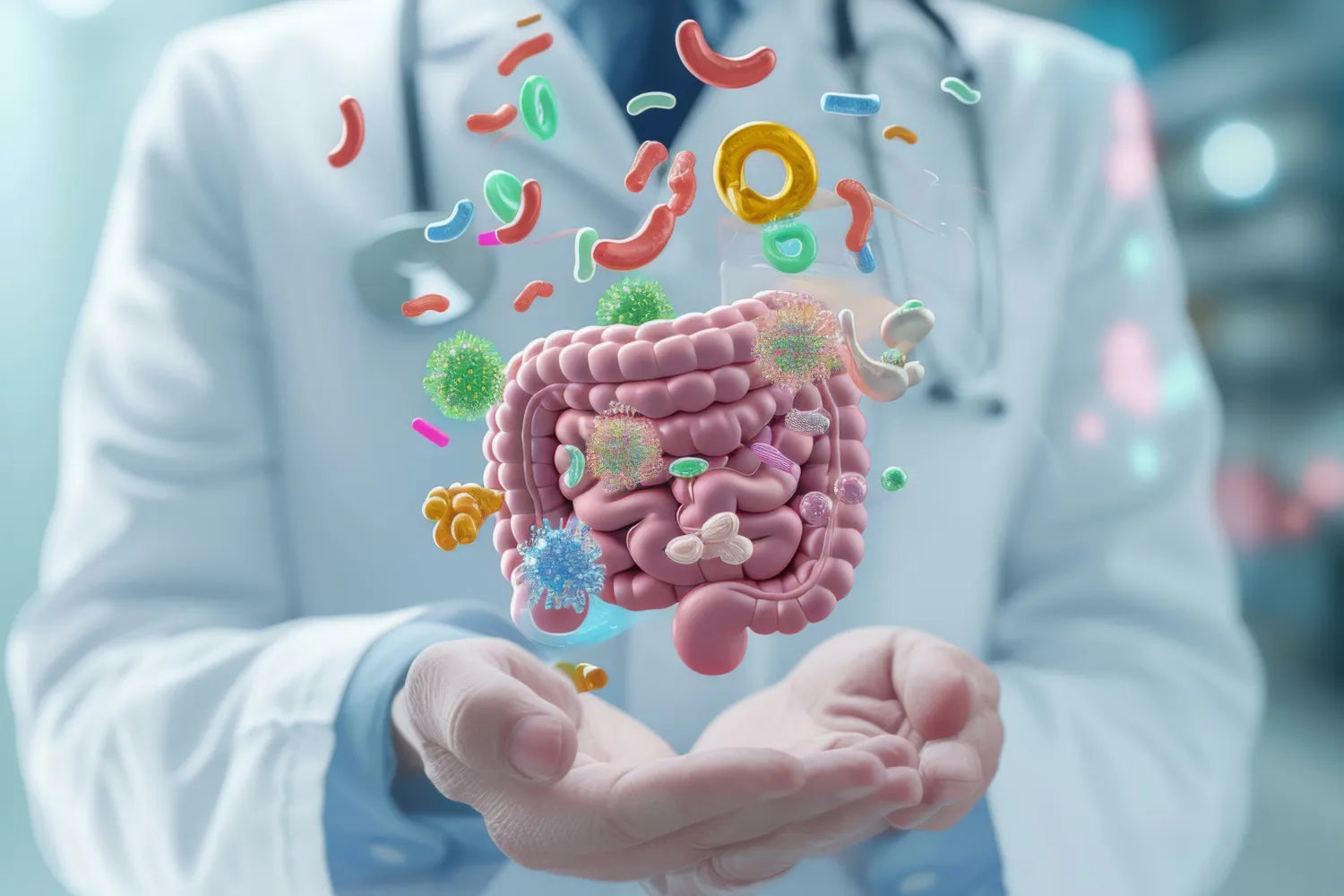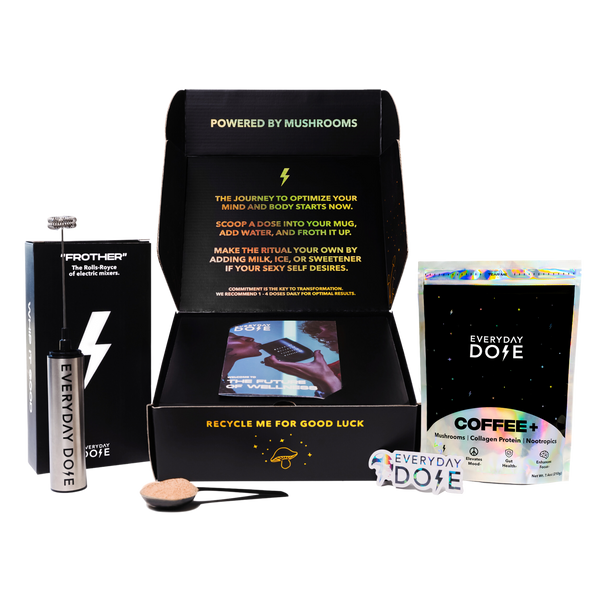How To Improve Gut Health, According to Experts

Gut health is currently a hot topic in the wellness community — and for a good reason. As it turns out, gut health is basically the foundation for every other area of health. Protecting the gut microbiome and the integrity of our digestive organs is one of the most important ways to support our overall health.
But how exactly do you go about this? Here are seven ways you can support your gut health and encourage overall wellness in your body.
7 Ways To Improve Gut Health
Having a healthy gut is important, but preserving its health may seem a little confusing. Your gut is mainly made up of intestines — how exactly can you make sure those are healthy? It’s not like you can take them out of your body and give them a cleaning.
Ultimately, supporting your gut health comes down to knowing how your gut works and helping it perform those functions to the best of its ability. Here are a few top tips recommended by experts.
1. Take Probiotics
Probiotics are good bacteria that can help counteract bad bacteria in your gut. Ideally, all types of bacteria and fungi exist in a delicate balance within your gut. This harmony is what gives rise to all kinds of health benefits.
Probiotic foods are foods that have been specifically fermented with good bacteria. The bacteria colonize the food and can also colonize our gut when we consume these foods.
Examples of fermented foods include:
- Kombucha
- Yogurt
- Sauerkraut
- Tempeh
- Kimchi
- Miso
- Kefir
- Vinegar
If you prefer to avoid the tanginess of probiotic foods, you can opt to take probiotic supplements instead. These supplements often have billions or even trillions of probiotics in them and many even have an exact count of each type of bacteria in them.
2. Eat Prebiotics
Like most living things, probiotic bacteria need food to survive. In particular, these bacteria love prebiotic fiber, a type of soluble fiber that can ferment in the intestines.
This fiber is non-digestible, which means it arrives in your intestines largely untouched. Your good bacteria will then use this fiber to reproduce, filling your gut microbiome with even more beneficial bacteria.
Examples of prebiotic fiber-rich foods include the following:
- Jerusalem artichokes
- Bananas
- Onions
- Garlic
- Lentils
- Legumes
- Leeks
- Whole grains
Certain mushrooms are also great sources of prebiotic fiber. For instance, lion’s mane mushrooms are rich in beta-glucans, a type of polysaccharide that acts like prebiotic fiber. That’s just one of many reasons why lion’s mane is the star ingredient of our Mushroom Coffee+, a delicious functional coffee blend. Plus, our formula also features collagen to support your gut lining.
3. Support Mental Health
Have you ever gotten a stomach ache from stress? As it turns out, mental health can have a huge effect on digestive health through something called the gut-brain connection.
Certain types of bacteria produce neurotransmitters that can help control mood (for instance Bifidobacterium can produce GABA), but communication also happens the other way around. High stress levels can damage good gut microorganisms and alter your gut microbiome. Stress can also cause indigestion due to the high levels of stress hormones and how they interact with your gut.
You can minimize stress levels by engaging in relaxing activities like reading, meditating, and practicing yoga. You can also try taking supplements like our Mushroom Coffee+ to support a healthy stress response. In addition to prebiotics and collagen, our blend includes L-theanine to support overall mental health and clarity. Plus, lion’s mane can also relieve feelings of stress and anxiety.
4. Balance Your Macros
What you eat plays a huge role in the diversity of your gut microbiome. For instance, eating a balanced diet rich in protein, fatty acids, and complex carbohydrates can give your body the fuel it needs to maintain balance and support the integrity of your gut lining.
If your gut lining begins to give way due to inflammation, it can cause your body to absorb toxins from the food you eat. This can also prevent you from being able to properly absorb vitamins and minerals, which can reduce the health benefits you might see from your food.
At the same time, it’s important to avoid foods that can harm your gut microbiota. For instance, ultra-processed foods and many natural and artificial sweeteners can cause an imbalance in good and bad gut bacteria. Instead, prioritize whole foods when you can.
5. Prioritize Sleep
Everyone knows that sleep is important for overall health and well-being. Losing sleep can quickly cause stress, irritability, mental health problems, brain fog, and so much more. However, you may not have known that poor sleep can also affect your gut.
In fact, sleep deprivation can change the composition of your gut bacteria in as little as 48 hours. Getting high-quality sleep is one of the most important things you can do to encourage a healthy microbiome.
6. Get Some Exercise
Exercise isn’t just great for weight loss and heart health — it can also support the beneficial bacteria in your gut. One systematic review showed that just 30 minutes of moderate to vigorous aerobic exercise five times a week could improve the gut microbiome in as little as eight weeks. Plus, movement from physical activity can help stimulate the digestive system and keep things moving along.
If high-intensity exercise sounds a little intimidating, don’t let that stop you. Start with a brisk 10-minute walk and slowly work your way up to 30 minutes or more of jogging, cycling, or stair climbing.
7. Work With a Healthcare Provider
Finally, you should work with a doctor or dietitian if you have a serious digestive problem. For instance, if you have symptoms of irritable bowel syndrome (IBS), supporting your gut health can be a good step in the right direction — but you’ll ultimately want to work with a gastroenterologist to make sure you accurately treat your health condition.
Why Is Gut Health Important?
As we mentioned previously, gut health can affect pretty much every area of the body. When there is an overgrowth of bad bacteria (a condition clinically called dysbiosis), you’ll see symptoms far beyond your small and large intestines.
Symptoms of poor gut health include the following:
- Bloating
- Heartburn
- Impaired immune system
- Constipation
- Diarrhea
- Feelings of depression and anxiety
- Fatigue
- Mental fogginess
- Gastrointestinal discomfort
- Dysregulated blood sugar
The Bottom Line
Our digestive tracts are home to trillions of little microbes that can have massive effects on our overall health. These bacteria are very susceptible to lifestyle factors like the foods we eat, how much we sleep, our stress levels, and even our exercise routines. Luckily, this means there are plenty of ways you can support your gut microbiome.
At Everyday Dose, we know how important it is to protect and preserve the gut microbiome. That’s why our mushroom blends feature ingredients that can support gut bacteria, encourage balanced mental health, and support healthy sleep. To learn more about the benefits of mushroom coffee, visit our blog today.
Sources:
Gut microbiome diversity is associated with sleep physiology in humans | PMC
How your gut microbiome is linked to depression and anxiety | CAS








